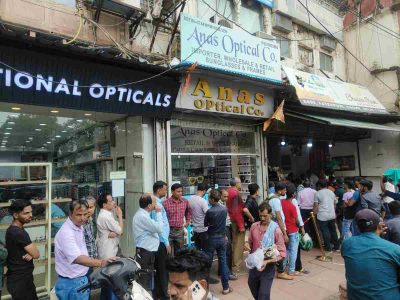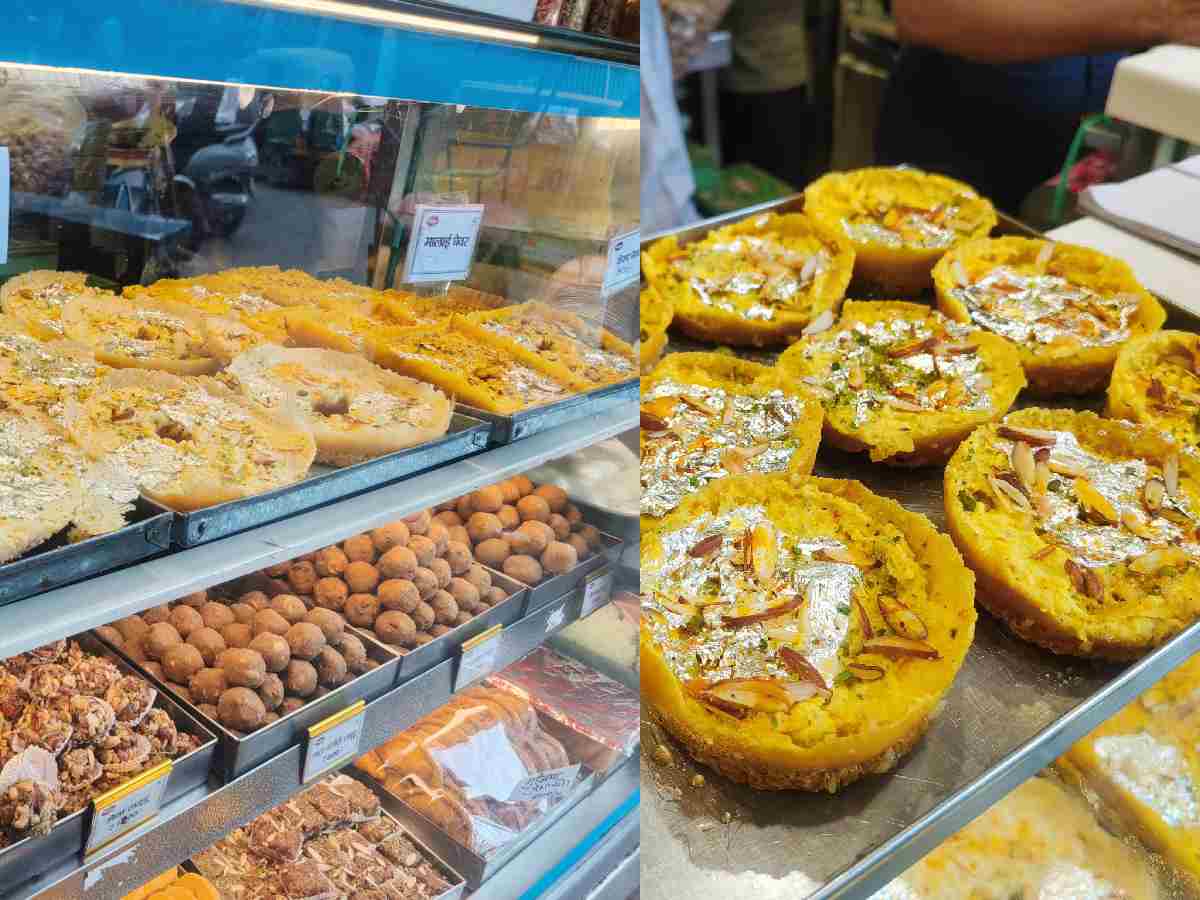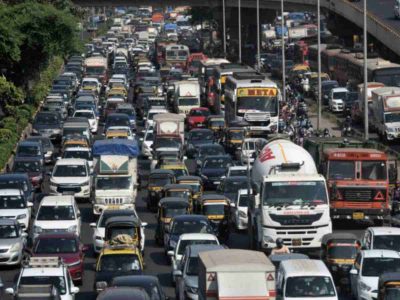As monsoon clouds gather over Delhi, bringing relief from the scorching summer heat, a confectionery delight awaits its residents: Ghevar.
This traditional Rajasthani dessert is cherished for its crispy texture and sweet allure. It is crafted from flour, ghee, and sugar syrup, and is intricately prepared to achieve a distinctive texture that is both crunchy and soft.
The origin of Ghevar can be traced back to the royal courts of Rajasthan, where chefs crafted it for the Maharajas before it eventually made its way to the common people of Rajasthan and other parts of the country.
This delightful treat undergoes a process where the batter is poured into hot ghee, forming concentric rings that define its characteristic shape. Once fried to a golden hue, it is drenched in aromatic sugar syrup, infusing each bite with sweetness.
Also Read: Monsoon Delights: 10 Must-Try Street Foods in Delhi
Ghevar holds cultural significance beyond its culinary appeal. It is prominently featured during festive occasions such as Teej and Raksha Bandhan, symbolising celebration and togetherness.
Ghevar is a popular dessert choice in Delhi too. The cool, rainy weather provides the perfect backdrop for savouring its rich flavours and indulgent textures. Delhiites eagerly anticipate its arrival in sweet shops across the city, especially in areas with a vibrant Rajasthani community like Chandni Chowk and Karol Bagh.
One can see people in long queues outside Chaina Ram Sindhi Halwai, one of the oldest sweets shops in Delhi’s Chandni Chowk area, known for serving the highest quality Ghevar since 1901.
“We offer Lal Doodh Malai Ghevar at Rs 960 per kg and Malai Ghevar at Rs 820. We use pure desi ghee instead of refined oil, which adds to its health benefits,” said Sunny Gidwani, one of the owners.

He emphasised their commitment to quality, saying, “We cook from the heart so that everyone, regardless of age, can relish our food.”
Gidwani represents the fifth generation in his family running this business.
Originally from Sindh, Pakistan, the family had a sweetshop with the same name in Lahore’s Anarkali market before Partition. It was started by Lala Chaina Ram.
About a kilometre away lies another iconic shop, Shyam Sweets, which has a history of serving Ghevar to prominent politicians in Delhi.
“We have previously served Prime Minister Narendra Modi, Atal Bihari Vajpayee, Indira Gandhi, and Jawaharlal Nehru,” said Sanjay Agarwal, the owner.
Apart from Ghevar, the shop also serves other delicacies to politicians.
“We serve breakfast to Om Birla and sometimes in the office of Amit Shah. They are fond of Bedmi Poori-Aloo Sabzi and Nagori halwa,” he added.
Agarwal, a fourth generation from his family running this business, mentioned that his son, a hotel management graduate, is also keen on joining the family business.
Established in 1984, Kaleva Sweets in Delhi’s Karol Bagh has earned a reputation for high quality Indian sweets. The shop offers an extensive range of Ghevar, including Malai, Kesar, Gud, Chocolate, Mango, and Pista, all made in-house to ensure top-notch quality.
Ajay Kumar, a spokesperson from Kaleva Sweets, noted the extra hours required to handle the high demand for Ghevar and other Saavan (rainy season) specialties.
“Beyond sweets, Kaleva excels in snacks, including popular dishes like Dahi Bhalla, Chholey Bhature, and their famous Sunday special, Bedmi Puri. This family-run business continues to thrive by blending tradition with innovation,” he said.
Durgesh Singh, the manager at Kanwar Ji Confectioners in Chandni Chowk, explained, “Ghevar cannot be made year-round due to its reliance on monsoon’s moisture. Ghevar requires specific humidity present only during Saavan; otherwise, it dries up like a papad.”
The three-generation legacy at Nathu Sweets in Bengali Market is renowned for its exceptional Ghevar during the monsoon season, featuring flavours like Malai, Kesar, and Plain, as well as unique shapes such as triangles, squares, and hearts for Raksha Bandhan.
Indu Sharma, one of the owners, highlighted, “Nathu Sweets continues to attract customers year after year, maintaining its place as a beloved destination in Delhi’s vibrant food scene.”
Vivek Pareek, manager of Bikanervala at Chandni Chowk, noted the steady flow of visitors for daily Ghevar purchases.
Also Read: Fancy Food Carts in Delhi
“Around 250 people visit our restaurant each day,” he said.
“We have been making it traditionally in round shapes, and for many years, we have also been making cup-shaped Ghevars,” he added.
“We offer various types of Ghevar, including Pineapple, Rose, Khus, Mango, Thandai, and large Kesar,” said Ajay Chaubey, manager of Haldiram’s at Chandni Chowk.
Families and friends exchange Ghevar as a gesture of love and festivity, enhancing its value as more than just a dessert but a tradition steeped in warmth and tradition.
Local halwais also showcase their expertise in crafting this sweet.
Ghevar remains a cherished treat that embodies the spirit of monsoon festivities. Its crunchy sweetness, combined with the traditions it represents, makes Ghevar a beloved dessert that continues to captivate both locals and visitors alike. With every bite, Ghevar not only satisfies the palate but also celebrates the cultural richness and warmth that define Delhi during the monsoon season.





